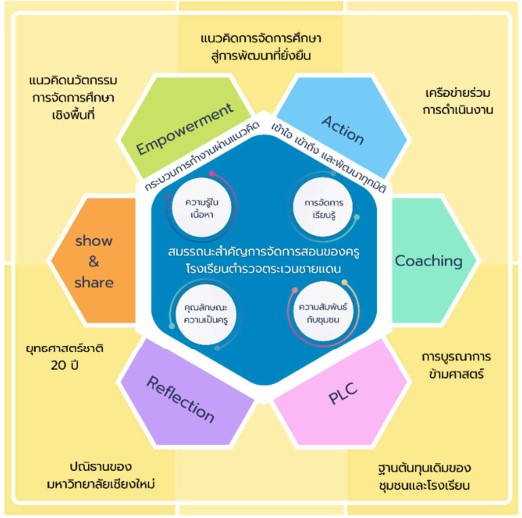An Action Research for Developing Both Teacher Competencies and Border Patrol Police Schools in Chiang Mai Province Towards Sustainable Development
Keywords:
Action Research, Developing Teacher Competencies, Border Patrol Police Schools in Chiang Mai ProvinceAbstract
The purpose of this research was to systematically address the challenges and requirements in developing a comprehensive model aimed at enhancing both teacher competencies and the educational environment of border patrol police schools in Chiang Mai province, with a focus on fostering sustainable development. Additionally, the study aimed to assess the outcomes of implementing this model. The key findings are summarized as follows: The proposed model is grounded in a robust conceptual framework that encompasses the understanding, assessment, and enhancement of all dimensions. The procedural steps include: (1) analyzing the initial costs for development, (2) fostering understanding and establishing common goals collaboratively with all stakeholders, (3) collectively designing a model to address the unique challenges of border patrol police schools, (4) taking concerted action to establish common goals and design a model that fosters learners' competency through holistic integration, and (5) implementing and evaluating the model in classroom settings, with ongoing support through coaching and mentoring. Observations of changes in competencies across the board indicated that teachers exhibited increased proficiency in all four components, particularly in organizing active learning. Principals demonstrated enhanced abilities in designing, planning, and managing schools for more effective learning management, aligning with the overarching objective of learner development. Students' average scores in Thai language witnessed improvement, showcasing the schools as exemplars in active learning management grounded in the integration of surrounding phenomena and spatial identity. This approach is congruent with adapting education to evolving community dynamics, serving as a foundation for developing students' competency. Cooperative development schools showcased the ability to collaborate effectively, fostering sustainability through shared processes.
References
เกรียงศักดิ์ เจริญวงศ์ศักดิ์. (2560, 10 ตุลาคม). สยามรัฐสัปดาห์วิจารณ์: บูรณาการข้ามศาสตร์อีกหนึ่งความพยายามเปลี่ยนโลกของฮาร์วาร์ด. สยามรัฐ. http://www.kriengsak.com/node/953
เกียรติสุดา ศรีสุข. (2564). กลไกขับเคลื่อนระบบการบริหารจัดการเพื่อเสริมสร้างสมรรถนะครูในพื้นที่นวัตกรรมการศึกษาจังหวัดเชียงใหม่. มหาวิทยาลัยเชียงใหม่.
เกียรติสุดา ศรีสุข. (2565). การวิจัยเชิงปฏิบัติการเพื่อพัฒนาสมรรถนะครูและโรงเรียนตำรวจตระเวนชายแดนในพื้นที่จังหวัดเชียงใหม่สู่การพัฒนาที่ยั่งยืน. มหาวิทยาลัยเชียงใหม่.
จุฬากรณ์ มาเสถียรวงศ์ และคณะ. (2555). วิกฤตการจัดการศึกษาของรัฐ สัญญาณเตือนจากกระแสโลก ในโครงการจับกระแสความเคลื่อนไหวและนวัตกรรมการจัดการศึกษาและการพัฒนาเด็กและเยาวชน (INTREND) [เอกสารที่ไม่ได้ตีพิมพ์]. สถาบันรามจิตติ สำนักงานกองทุนสนับสนุนการวิจัย (สกว.)
แบ้งค์ งามอรุณโชติ และคณะ. (2559). รูปแบบการจัดการศึกษาเชิงพื้นที่: บทเรียน ทางเลือกและเงื่อนไขความสำเร็จ. สำนักงานเลขาธิการสภาการศึกษา กระทรวงศึกษาธิการ.
ปรัชญา เวสารัชช์. (2554). หลักการจัดการศึกษา. ภาพพิมพ์.
ปุณรัตน์ พิพิธกุล. (2565). การจัดการความรู้ของโรงเรียนตำรวจตระเวนชายแดนที่สอดคล้องตามแผนพัฒนาเด็กและเยาวชนในถิ่นทุรกันดาร ตามพระราชดำริสมเด็จพระเทพรัตนราชสุดาฯ สยามบรมราชกุมารีฉบับที่ 5 พ.ศ. 2560 - 2569 เพื่อเสริมสร้างสุขภาวะความอยู่ดีมีสุข. มหาวิทยาลัยราชภัฏอุดรธานี.
พงษ์ศักดิ์ ศิริพงษ์. (2555). ยุทธศาสตร์การพัฒนาคุณภาพนักเรียนในโรงเรียนตำรวจตระเวนชายแดน. ปรัชญาดุษฎีบัณฑิต. ยุทธศาสตร์การพัฒนาภูมิภาค.
พศิน แตงจวง. (2554). รูปแบบการพัฒนาสมรรถนะบุคลากรทางการศึกษา. ดวงกมลพับลิชชิ่ง.
วิจารณ์ พานิช. (2555). วิถีสร้างการเรียนรู้เพื่อศิษย์ในศตวรรษที่ 21 (พิมพ์ครั้งที่ 1). มูลนิธิสดศรีสฤษดิ์วงศ์.
ศิรภัสสรณ์ วงศ์ทองดี. (2556). การพัฒนาทรัพยากรมนุษย์. สำนักพิมพ์แห่งจุฬาลงกรณ์มหาวิทยาลัย.
สมเกียรติ อินทสิงห์ และคณะ. (2564). การวิจัยและพัฒนานวัตกรรมการจัดการเรียนรู้และระบบการวัดและประเมินผลในพื้นที่นวัตกรรมการศึกษาจังหวัดเชียงใหม่. มหาวิทยาลัยเชียงใหม่.
สํานักงานเลขาธิการสภาการศึกษา. (2562). แนวทางการพัฒนาสมรรถนะผู้เรียนระดับการศึกษาขั้นพื้นฐาน. 21 เซ็นจูรี่.
สำนักงานเลขาธิการสภาการศึกษา. (2547). การประชุมวิชาการ การวิจัยทางการบริหารการศึกษา. โรงพิมพ์และทำปกเจริญผล.
สิริพัชร์ เจษฎาวิโรจน์. (2550). การออกแบบการจัดการเรียนรู้แบบ Backward Design. มหาวิทยาลัยรามคำแหง
สุริยา เหมตะศิลปะ. (2562). ศึกษาศาสตร์กับการศึกษาเพื่อการพัฒนาที่ยั่งยืน. คณะศึกษาศาสตร์ มหาวิทยาลัยทักษิณ.
Barrera - Osorio, F. et.al (2009). Decentralized decision-making in schools: the theory and evidence on school-based management. Directions in development; human development. World Bank.
Dillon, A. and Norris, A. (2005). Crying Wolf: An examination and reconsideration of the perception of crisis in LIS education. Journal of Education in Library and Information Science, 46(4), 280-298.
Hanirattisai, K. (2018). Issues and Trends in Education for Sustainable Development. https://bic.moe.go.th/index.php/gallery/2021-08-29-21-34-25/320-issues-and-trends-in-education-5-4-61.
Symeonidis, V., & Schwarz, J.F. (2016). Phenomenon-based teaching and learning through the pedagogical lenses of phenomenology: The recent curriculum reform in Finland. Forum Oswiatowe, 28(2), 31 - 47.
Zhukov, T. (2015). Phenomenon-based learning: What is PBL?. https://www.noodle.com/articles/phenomenon-based-what-is-pbl
Translated Thai References
Charoenwongsak, K. (2017), 10 October). Siamrath Week of Criticism: Integrating Across the Sciences Another World-Changing Effort of Harvard University. Siam Rath. http://www.kriengsak.com/node/953
Hemtasilp, S. (2019). Education for sustainable development. Faculty of Education, Thaksin University.
Inthasingh, S. et al. (2021). The research and development of innovations in learning management and measurement and evaluation systems in the educational innovation area of Chiang Mai Province. Chiang Mai University.
Jesadawirot, S. (2007). The design of learning management in the backward design. Ramkhamhaeng University
Masatianwong, J. et.al. (2555). The state education crisis: Warning signs from the global trend in the Trends and Innovations Program in Education and Child and Youth Development (INTREND) [Unpublished manuscript]. Ramajitti Institute, Thailand Research Fund.
Ngamarunchote, B. et.al. (2559). Spatial education management model: Lessons, choices, and success conditions. Office of the Education Council, Ministry of Education.
Panich, W. (2555). The ways to create learning for students in the 21st century. Sod Sri Saritwong Foundation.
Phiphithkul, P. (2565). Knowledge management of the Border Patrol Police School in accordance with the Child And Youth Development Plan in the Wilderness according to Her Royal Highness Princess Maha Chakri Sirindhorn Siam Boromrajakumari No.5 2017–2026 to promote well-being. Udon Thani Rajabhat University.
Siripong, P. (2555). The strategies for developing student quality in border Patrol Police schools. (Unpublished doctoral dissertation). Regional Development Strategy.
Srisuk, K. (2021). Mechanism for driving management system to enhance teacher competency in Chiang Mai education sandbox. Chiang Mai University.
Srisuk, K. (2022). An action research for developing both teacher competencies and border patrol police schools in Chiang Mai province towards sustainable development. Chiang Mai University.
Tangjuang, P. (2554). Educational personnel competency development model. D.K. Book Distributor.
The Secretariat of the Education Council. (2004). Academic Research Conference on Educational Administration. Charoenphol press.
The Secretariat of the Education Council. (2019). Guidelines for the development of learner competency at the basic education level. 21 Century.
Vesarach, P. (2554). Principles of educational management. Parbpim.
Wongthongdee, S. (2013). Human resource development. Chulalongkorn University Press.

Downloads
Published
How to Cite
Issue
Section
License
Copyright (c) 2023 Department of Educational Research and Psychology, Faculty of Education, Chulalongkorn University

This work is licensed under a Creative Commons Attribution-NonCommercial-NoDerivatives 4.0 International License.
All published content in JRM is licensed under a Creative Commons Attribution-NonCommercial-NoDerivatives 4.0 International License (CC BY-NC-ND 4.0).


